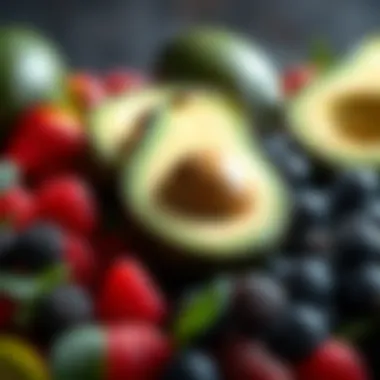Discovering Fruits That Fit the Keto Diet


Intro
The ketogenic diet, commonly known as keto, has carved out a significant niche among those pursuing weight loss and improved metabolic health. One recurring challenge that arises is the perception of fruit’s role in this low-carbohydrate lifestyle. With the ever-present notion that carbohydrates are the enemy, many might think all fruits are off-limits. Yet, fruits come in various shapes, sizes, and carbohydrate content. Understanding which fruits can align with a keto diet is crucial—not only for maintaining ketosis but also for enriching dietary variety.
Trial and error might have led some to mistakenly avoid fruits altogether, opting instead for processed snacks. However, several fruits can be genuinely enjoyable while still being keto-friendly. Knowledge is pivotal here; figuring out what fruits maintain the balance between carb intake and tasty additions to meals can transform one’s eating habits. From berries to certain melons, each choice offers an array of nutritional benefits essential for a rounded meal plan.
This journey into the world of keto-friendly fruits will dissect the intricacies of selecting the right options while also busting common myths surrounding fruit consumption in a ketogenic diet. After all, who said healthy eating needs to be dull?
Prelude to the Ketogenic Diet
The ketogenic diet, commonly referred to as keto, has carved a niche for itself in the wellness community. More than just a passing trend, it represents a fundamental shift in how people perceive and approach food consumption. Essentially, this diet emphasizes a low-carbohydrate intake, pushing the body to shift its primary fuel source from carbohydrates to fats. This metabolic state, known as ketosis, provides a range of potential benefits, including improved energy levels and increased mental clarity.
Understanding the ketogenic diet helps individuals make informed choices about their food intake. For those seeking to shed surplus weight or enhance their metabolic health, recognizing the dynamics of this dietary paradigm is essential. It's not just about what you eat, but how those foods interact with your body’s biochemistry.
Considerations surrounding the ketogenic diet also encapsulate more than nutritional choices. Individuals embarking on this journey often need to navigate a world rich in high-carb temptations while ensuring they stay within their desired macro ratios. This requires planning and a good grasp of how various foods fit into the keto framework, especially when it comes to fruits, which can be tricky due to their natural sugar content.
Principles of Ketosis
At its core, ketosis is a metabolic state wherein the body becomes highly efficient at burning fat for energy. When carbohydrate intake is significantly reduced, the body must adapt to find alternative energy sources. This process typically takes a few days of strict low-carb eating. The liver begins to convert fatty acids into ketones, which serve as a source of fuel for both the brain and the body. This shift can lead not only to fat loss but also to stabilized energy levels and improved focus.
Keto encourages the consumption of quality fats, while also caring about protein sources. These primary fuel changes create an environment where hunger can be subdued and cravings for sugar and carbohydrates can diminish over time. By maintaining a ketogenic state, many experience lower insulin levels and an overall favorable metabolic profile.
Macronutrient Ratios
For a successful ketogenic diet, macronutrient ratios are key. A typical keto plan consists of roughly 70-75% fats, 20-25% protein, and 5-10% carbohydrates. Adjusting these values can vary slightly depending on individual goals and dietary needs but generally keeps to this framework.
- Fats: Healthy fats are the backbone of a ketogenic diet. This includes sources like avocados, olive oil, and nuts. Not all fats are created equal, and opting for unsaturated fats rather than saturated fats can provide better health outcomes.
- Proteins: While protein is essential, consuming too much can hinder the process of ketogenesis because excess protein can be converted to glucose through gluconeogenesis. It is vital to choose high-quality protein sources, emphasizing fish, poultry, and plant-based options.
- Carbohydrates: The goal is to maintain a low intake of carbohydrates, ideally from non-starchy vegetables, nuts, and, as we will explore later, specific fruits that align with keto principles.
Striking the right balance within these macronutrient parameters can be challenging; however, it brings the rewards of a more satisfied appetite and sustainable energy levels. Making informed choices about what to include in your diet is a pivotal part of harnessing the benefits of the ketogenic lifestyle.
The Role of Fruits in Nutrition
Fruits hold a significant position in nutrition and dietary guidelines, offering an assortment of essential nutrients vital for the body’s functioning. When focusing on a ketogenic diet, it becomes crucial to dissect the role of fruits. Many may wonder if fruits can fit seamlessly into such a low-carbohydrate framework, and the answer lies within understanding their nutritional profiles and how they influence health.
Fruits are not just a source of sugar; they bring along a plethora of vitamins, minerals, and antioxidants that can bolster overall wellness. This section delves into the nuances of fruit consumption within a keto diet and outlines the nutritional benefits along with considerations one must take into account when choosing fruits.
Nutritional Benefits of Fruits
Fruits stand out due to their high concentration of vital nutrients. The benefits of integrating certain fruits into a ketogenic diet are many, and understanding these can aid in making informed dietary choices. Here are some of the prominent advantages:
- Vitamins and Minerals: Fruits are rich in important vitamins like vitamin C, potassium, and folate, which support immune health and cellular function.
- Antioxidants: Many fruits, particularly berries, are high in antioxidants that help combat oxidative stress and reduce inflammation in the body.
- Hydration: Fruits with high water content, like cucumbers and tomatoes, contribute to hydration, an often-overlooked aspect of nutrition.
- Flavor Variety: Including fruits can enhance palate and satisfaction in meals, potentially leading to better adherence to dietary regimes.


Thus, fruits can serve not only as sources of essential nutrients but also as important components of taste and enjoyment in a well-rounded diet.
Fiber and Its Importance
Fiber is another cornerstone of why fruits play a crucial role in nutrition. It promotes digestive health, aids in satiety, and helps regulate blood sugar levels—a particularly important factor for those on a ketogenic diet.
- Digestive Health: Fiber works as a prebiotic, feeding beneficial gut bacteria and promoting a healthy gut microbiome.
- Satiety: By including fiber-rich fruits, individuals may feel fuller for longer, reducing the temptation to overeat other high-carb foods.
- Blood Sugar Regulation: The type of fiber found in many fruits helps modulate the release of sugar into the bloodstream, preventing spikes that can lead to cravings.
Incorporating fiber-rich fruits into daily meals not only enhances nutrition but also contributes to overall health and wellbeing.
Fruits That Fit the Keto Profile
In the world of ketogenic diets, the choice of fruits can seem like a tightrope walk. Fruits are typically associated with natural sugars, which, in a low-carb lifestyle, can complicate things. However, not all fruits are created equal, and some actually blend seamlessly into a keto-friendly regime. Understanding which fruits fit this category can enhance dietary flexibility while adhering to the principles of ketosis. This section delves into specific fruits that provide nutritional benefits without throwing a wrench in your carb counting, making your journey through the keto landscape smoother.
Berries: Low in Carbs, High in Nutrients
Berries are often touted as the poster children of keto fruits. They bring the taste of sweetness without wrecking your carb limit. With a rich profile, they are packed with antioxidants, vitamins, and fiber. Here, we’ll highlight three popular types of berries that can be beneficial when consuming a ketogenic diet.
Strawberries
Strawberries are a delightful option for those on a keto diet. They are not just mouth-watering; they carry a low carb count. A cup of fresh strawberries has about 11 grams of carbohydrates but also contains plenty of vitamin C and manganese. What makes them standout is their high fiber content which aids in digestion and supports gut health. Additionally, they can be used in various dishes—be it salads, smoothies, or just a refreshing snack. However, one might consider the sugary flavor as a reason to moderate portions, especially when striving for precise carb control.
Raspberries
Raspberries take the crown with an incredible low-carb profile, making them another superb choice. They contain roughly 7 grams of carbs per cup, along with an impressive amount of fiber, hitting at around 8 grams. This means their net carbs actually hover around 5 grams per cup! Their tartness also adds a unique flavor when incorporated into desserts or breakfast bowls. Not only do they satisfy a sweet craving, but they offer anti-inflammatory properties benefits as well. That said, the fetching price can sometimes make them seem less appealing in the long run.
Blackberries
Blackberries shine due to their diverse nutrition benefits and relatively low carbohydrate content. Similar to raspberries, a cup amounts to about 7 grams of total carbohydrates and brings a hefty dose of vitamin K and C. Their juicy flavor is often enjoyed in smoothies or yogurt. The presence of phytonutrients is a bonus, providing additional health benefits. Nevertheless, their seasonal availability could pose a challenge for regular consumption.
Avocado: A Unique Fruit
Now, if there's a fruit that carries the crown in the keto kingdom, it's the avocado. Low in carbohydrates, high in healthy fats, and a remarkable source of vitamins, avocados can be an ideal staple in a keto diet. They provide approximately 2 grams of carbs per serving, packed with potassium and fiber that contributes to maintaining electrolytic balance, especially when transitioning into ketosis. Its creamy texture lends itself well to both savory and sweet dishes. However, the higher caloric content means one should be cautious not to overindulge. Overall, avocados are a friendly companion on your keto journey, promoting satiety and satisfaction.
Olives: Small Yet Mighty
Olives might be small, but they sure pack a punch when it comes to a keto diet. With just around 3 grams of carbs per ounce, these tasty little wonders bring healthy monounsaturated fats to the table, adding both flavor and nutritional density. Their rich source of vitamin E and antioxidants helps combat oxidative stress, making them a brain-boosting snack. Whether served whole, sliced, or in tapenade, they harmonize well with various dishes. However, keep in mind that some olives are cured in a way that can sneak in undesirable sodium levels if you're watching your intake.
Coconuts: Versatile and Nutritional
Coconuts befit a keto lifestyle, contributing both fiber and healthy fats while maintaining a lower net carb count. Fresh coconut meat contains about 6 grams of carbs per ounce, yet it's the high fat content that makes it uniquely suited for keto dieters. You can find coconut products in many forms—oil, milk, and shredded flakes—all of which can add flavor and richness to dishes. While the fibrous nature aids digestive health, the distinct taste can be a hit or miss for certain palates. Plus, the versatility they offer means you can integrate coconuts into your meals in multiple ways. However, due to their calorie density, moderation remains key.
Fruits in the keto realm illuminate the possibilities of incorporating healthy nutrients while respecting carb restrictions. Knowing these fruits can empower choices that support both taste and health.


Fruits to Approach with Caution
Navigating the intricate landscape of fruits suitable for a ketogenic diet requires a careful approach. While fruits are generally viewed as wholesome, certain varieties can disrupt the delicate balance of ketosis. Understanding which fruits to consume with caution is key for anyone serious about maximizing the benefits of their low-carb lifestyle.
When we discuss fruits in the context of keto, it’s essential to consider their sugar content, primarily in the form of fructose. Higher sugar fruits can sneak a significant number of carbs into your diet, potentially stalling your progress toward achieving or maintaining ketosis. Balancing enjoyment and restriction is crucial; knowing which fruits might take you over the edge can keep your dietary goals on track.
Higher Sugar Fruits
Grapes
Grapes are often seen as a summertime staple—refreshing and sweet. However, these little bunches of joy are packing more carbs than many realize. A cup of grapes contains around 27 grams of carbohydrates, which is hefty compared to other fruits like berries. While they do offer good hydration and antioxidants, those watching their sugar intake should exercise caution. Its juicy sweetness is a tempting treat, but just a handful could significantly impact your daily carb allowance, compromising your keto efforts.
Mangoes
Mangoes, the tropical delight, bring with them a burst of flavor and nostalgia. They often boast high vitamin C levels, making them a popular choice for immune health. Yet, one medium mango can contain upwards of 45 grams of carbs. That’s a hefty toll for a single fruit. While they are delicious, someone adhering strictly to keto might need to find alternatives—such as a small portion of a low-carb fruit—that gives satisfaction without tipping the scales. Simply put, even a small mango could lead to spikes in blood sugar, pulling you out of the desired metabolic state.
Bananas
Ah, the humble banana. It’s often viewed as a quick pick-me-up due to its abundance of potassium and easy accessibility. However, this fruit doesn't fit neatly into a keto plan because a medium-sized banana has about 27 grams of carbohydrates. The creamy texture and tropical taste make bananas enticing, but their carb density can be a stumbling block. For those on a ketogenic journey, it’s wise to approach bananas with the mindset of moderation—or perhaps save them for a special occasion rather than a daily staple.
"Knowing when to hold 'em and when to fold 'em is the secret of success in a ketogenic lifestyle."
Dried Fruits: A Hidden Trap
When considering fruits for a keto diet, dried fruits often slip under the radar, presenting an often surprising challenge. Dried varieties can be deceptively calorie-dense and high in sugar, bassically intensifying the carb content of their fresh counterparts. For instance, a mere quarter cup of raisins could contain over 30 grams of carbs.
Unsuspecting individuals may assume dried fruits are a practical snack option, but they can easily sabotage ketosis, leading to excessive carb intake in a small serving. Be wary of labeling these as healthy without carefully assessing their contents. For those committed to a ketogenic journey, fresh or frozen fruits are much safer alternatives that provide all the flavor without the hidden dangers of sugar.
In summary, while fruits play a fundamental role in nutrition, navigating this delightful array with caution is crucial for maintaining success on a ketogenic diet. By understanding the impacts of higher sugar fruits and avoiding the traps laid by dried fruits, one can savor the benefits of keto while satisfying the palate.
Incorporating Fruits into a Keto Diet
Embracing a ketogenic lifestyle necessitates a thoughtful approach, especially when it comes to fruits. While many fruits are revered for their health benefits, not all are suitable for the low-carb diet that keto promotes. Therefore, understanding how to integrate fruits into a keto diet is essential to maximize the diet's advantages. This involves knowing which fruits are beneficial, how to consume them in moderation, and ensuring that overall carbohydrate intake remains within the recommended limits.
One of the primary benefits of including fruits in a keto diet is their capacity to provide vital vitamins and minerals without overwhelming the body with carbohydrates. Fruits like berries, avocados, and olives offer a wealth of nutrients that can boost immunity and contribute to overall health, all while allowing one to stay in ketosis. Moreover, the fiber in these fruits can aid in digestion and may help mitigate some of the digestive issues that can accompany a low-carb regimen.
However, it's crucial to approach fruit consumption with caution. Portion control is key; these foods should complement, rather than dominate, a keto meal plan. Understanding the nuances of each fruit’s carb content helps manage daily intake effectively.
Meal Planning Tips
The art of meal planning can feel overwhelming, especially when balancing the restrictions of a ketogenic diet with the desire to enjoy fruits. Here are some practical pointers:


- Select Low-Carb Fruits: Focus on fruits that offer the most benefit with the least carbohydrate load. Berries, avocados, and olives are excellent choices that pack a nutritious punch.
- Portion Control: Use measuring cups or digital scales to avoid oversized servings that lead to carb overload. A small handful of raspberries or a quarter of an avocado can deliver health benefits without derailing your diet.
- Incorporate into Meals: Add fruits to your meals creatively. Tossing berries into a salad or blending avocado into smoothies can provide flavor and nutrition while keeping carb counts low.
- Snack Wisely: Keep low-carb fruit options on hand for snacking. They can provide the sweetness and satisfaction without the guilt, especially if you are fighting cravings.
- Experiment with Recipes: Look for keto-specific recipes that integrate fruits. For instance, avocado chocolate mousse or berry chia pudding can satisfy sweet cravings without compromising ketosis.
Balancing Carbohydrates
Finding the right balance of carbohydrates is critical when incorporating fruits into a keto diet. Here are considerations to help maintain that balance:
- Understand Your Limits: Typically, a standard keto diet advises keeping carbohydrate intake between 20g to 50g per day. Ensure that fruit choices fit comfortably within your daily goals.
- Track Your Intake: Utilize apps or journals to monitor carb consumption. By keeping an eye on how many carbs specific fruits contribute, you can make informed decisions that align with your dietary goals.
- Pair Wisely: Combine fruits with healthy fats or protein to slow digestive absorption. This might mean enjoying a small serving of berries with Greek yogurt or an olive tapenade on cheese.
- Adjust for Exercise: If you engage in high levels of physical activity, consider adjusting your carb allowance slightly. This may allow for a bit more leeway on fruit servings, ensuring that you have the energy needed without stepping out of ketosis.
The key to successfully integrating fruits into a ketogenic diet lies in making informed choices, being mindful of portions, and understanding how different fruits impact overall carbohydrate intake.
With these strategies in hand, you can enjoy the diverse flavors and nutritional benefits of fruits without jeopardizing your progress on a ketogenic path.
Common Misconceptions About Fruit and Keto
In grappling with the ketogenic diet, a treasure trove of misunderstandings looms large, especially when it comes to fruits. Misinformation can lead people down a slippery slope where they either avoid fruits entirely or reckon them as harmless. This section will shine a light on these misconceptions, engendering clarity amidst the confusion.
Fruits and Weight Gain
One common myth suggests that consuming fruit while on a keto diet inevitably leads to weight gain. This notion seems rooted in a surface-level understanding of carbs, often depicting fruits as sugary landmines. Yet, it's crucial to remember that not all fruits are created equal. While fruits do contain sugars, the impact depends significantly on the type and amount consumed.
Consider berries, for example. A cup of strawberries contains about 11 grams of carbs, which can fit snugly within the daily carb limits for an individual on a keto diet. Additionally, these fruits are high in fiber, which contributes to satiety and can actually help in weight management. It’s misleading to blanket all fruits together; it's more about making discerning choices.
If one indulges in low-carb options like avocados or berries, they can harness the nutritional benefits without bearing the weight gain burden. The real pitfalls arise from confusion over portion sizes, blindly opting for high-sugar fruits, or overlooking the full nutritional profile of these foods.
Remember: Knowledge is power. Assess the carbohydrate counts of the fruits you choose and make informed decisions.
Nutrient Density vs. Carbohydrate Count
The juxtaposition of nutrient density and carbohydrate count is another area rife with misconceptions. When people wax lyrical about carb counts, they often neglect the broader conversation of nutrient density. Yes, fruits contain carbohydrates, but many also pack essential vitamins, minerals, and antioxidants vital for health.
Nutrient-dense fruits like kiwi or avocados provide high nutritional value with comparatively low carbohydrate content and can fit snugly in your keto lifestyle. Take avocados: they boast a whopping amount of healthy fats and are crammed full of potassium and vitamins.
On the flip side, while a slice of cake may have fewer carbs than a serving of avocado, it’s devoid of nutritional value and can lead to setbacks on a keto journey. Therefore, prioritizing nutrient-dense foods over merely counting carbs can be life-changing for those committed to health.
By dismantling these misconceptions, individuals embarking on the keto journey can make educated decisions regarding fruit consumption, thus aligning their choices with their dietary goals.
Ending: Making Informed Choices
As we draw the curtain on this exploration of keto-friendly fruits, it’s essential to reflect on the takeaways that can profoundly affect your dietary choices. The ketogenic diet offers a unique approach to nutrition, but understanding how fruits fit into this model is equally important. Picking fruits that complement ketosis can support not only weight management but overall health. Deciphering what to include in your meal plan helps mitigate the risks of consuming unnecessary sugars that one might find in some fruits.
Moreover, as you embrace a keto lifestyle, it's crucial to navigate the balance of nutrients. Getting familiar with the carbohydrate content of various fruits helps in making informed choices. It’s not just about what you eat but also about how it fits into your overall macronutrient goals. Incorporating the right fruits can enhance your meals with vital vitamins and minerals without derailing your ketogenic journey.
Embracing Variety and Moderation
When considering keto-friendly fruits, it's easy to get caught in the trap of focusing solely on a handful of low-carb options. However, adhering to a broader array of choices can make your diet more sustainable and enjoyable. Many fruits, when consumed in moderation, can enrich your body with antioxidants and essential nutrients, vital for maintaining good health while on a restrictive plan.
It's essential to think of variety not just as a means to add flavor but as an opportunity to access a diverse range of nutrients. For example, while berries are well-established keto favorites, integrating small quantities of fruits like watermelon or cantaloupe can surprise you with their hydrating benefits and nutrient profiles. Making sure you enjoy different colors and types of fruits opens the door to a wealth of health advantages.
Remember that moderation is key. Overindulging in even the best choices can lead to unintended spikes in your daily carb intake, which may impede your state of ketosis. By measuring your servings, perhaps using a food diary or an app, you can keep track of your intake while still savoring the diversity that fruits have to offer.







